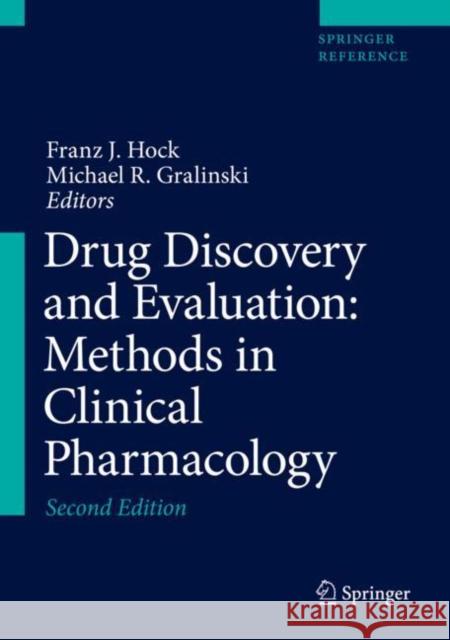Drug Discovery and Evaluation: Methods in Clinical Pharmacology » książka



Drug Discovery and Evaluation: Methods in Clinical Pharmacology
ISBN-13: 9783319688633 / Angielski / Twarda / 2020 / 1190 str.
Drug Discovery and Evaluation: Methods in Clinical Pharmacology
ISBN-13: 9783319688633 / Angielski / Twarda / 2020 / 1190 str.
(netto: 3642,26 VAT: 5%)
Najniższa cena z 30 dni: 2502,29
ok. 22 dni roboczych.
Darmowa dostawa!
These three volumes offer an overview on all aspects of clinical pharmacology. They divide the discovery and evaluations of new drugs into three distinct steps that expedite and facilitate this increasingly time-consuming and costly process.
Section A Introduction: 1 General Introduction; - Section B Human Studies in Clinical Pharmacology: 2 Methodologies of Safety Assessment in Clinical Pharmacology; - 3 Pharmacodynamic Evaluation: Cardiovascular Methodologies;- 4 Pharmacodynamic Evaluation: Pulmonary Methodologies;- 5 Pharmacodynamic Evaluation: CNS Methodologies;- 6 Pharmacodynamic Evaluation: Pain Methodologies; - 7 Pharmacodynamic Evaluation: Drug Dependency and Addiction;- 8 Pharmacodynamic Evaluation: Ocular Pharmacology; - 9 Pharmacodynamic Evaluation: Acoustic Pharmacology (Tinnitus); - 10 Pharmacodynamic Evaluation: Diabetic Methodologies;- 11 Pharmacodynamic Evaluation: Gastroenterology; - 12 Pharmacodynamic Evaluation: Endocrinology;- 13 Pharmacodynamic Evaluation: Inflammation/Immunology; - 14 Pharmacodynamic Evaluation: Dermatology;- 15 Pharmacodynamic Evaluation: Infectious Diseases;- 16 Pharmacodynamic Evaluation: Oncology;- 17 Pharmacodynamic Evaluation: Gentherapy;- 18 Pharmacodynamic Evaluation: Orphan Diseases; - 19 Clinical Studies in Infants (Pediatric Pharmacology); - 20 Clinical Studies in Geriatric Population; - 21 Personalized Medicine;- 22 Non-invasive Methodology (NMR);- 23 Traditional Chinese Medicine; - 24 Pharmacodynamic Evaluation: Herbal Medicine;- 25 Nanotechnology in Medicine;- 26 Methodologies of PD Assessment Scales;- 27 Methodologies of Pharmacodynamic Assessment;- 28 Pharmacodynamic Drug-Drug Interaction. Section C Clinical Pharmacokinetics: 29 Dose Finding in Single Dose Studies by Allometric Scaling;- 30 Multiple Dose Studies;- 31 Dose Linearity and Proportionality;- 32 Effects of Food Intake;- 33 Special Populations: Profiling the Effect of Obesity on Drug Disposition;- 34 Special Population: Renal Impairment;- 35 Special Population: Hepatic Impairment; - 36 Special Population: Protein Binding Aspects;- 37 The Human ADME Study;- 38 Synthesis of Radiolabeled Compounds for Clinical Studies;- 39 Drug-Drug Interaction Studies;- 40 In Vitro/In Vivo Correlation for Drug-Drug Interaction;- 41 Specific Studies for Formulation Development;- 42 Absolute and Relative Bioavailability;- 43 Bioequivalence; - 44 Population Pharmacokinetics in Clinical Pharmacology;- 45 Bioanalysis of Clinical Studies;- 46 Biomarker Definition and Validation During Drug Development;- 47 Toxicokinetics and Safety Ratios;- 48 In Vitro/In Vivo Correlation for Transporters;- 49 Relevance of Transporters in Clinical Studies; 50 Specificities for Oncology Studies;- 51 Pharmacogenomics in and its Influence on Pharmacokinetics;- 52 PK/PD Approaches. Section D Regulations: 53 Regulatory Guidance: EMA, FDA, ICH;- 54 Development of Regulations for Submitting Pharmacogenomic Data to Authorities; - 55 Pharmacogenomic-Guided Drug Development;- 56 Clinical Quality Management System
Franz J. Hock Since retiring from Aventis in 2002, Dr. Hock has leveraged his experience as a freelance consultant specializing in safety pharmacology. Dr. Hock was a research scientist at HOECHST, Hoechst Marion-Roussel, and Aventis from 1976 to 2002. He initially worked on methods in general pharmacology and nephrology, before becoming Head of Laboratory and devoting to pharmacological methods for drugs influencing memory and learning. He was ultimately Head of Laboratory for General/Safety Pharmacology at the Frankfurt site of Aventis Pharma Deutschland GmbH. Dr. Hock received his M.Sc. in Neurobiology from the Technical University Darmstadt and his D.Sc. in Zoology from the University Kassel, Department of Biology, Institute of Neuroethology and Biocybernetics. He received the degree of Fachpharmakologe DGPT (“Certified Expert Pharmacology”) in 1981. In 1983, Dr. Hock spent a sabbatical year at the University of California, Irvine, at the Center for the Neurobiology of Learning and Memory (Director Prof. Dr. James L. McGaugh). He lectured for several years to student of Biology at the University of Kassel and the Technical University Darmstadt. He has published over 100 original papers on methods in pharmacology and on new compounds. Furthermore, he held 28 patent applications to protect or broaden the application of lead structures. He is currently a member of the Task Force General/Safety Pharmacology German/Swiss Pharmaceutical Companies and is also member of several national and international scientific societies. Dr. Hock is founding member of “Safety Pharmacology Society,” “Neurowissenschaftliche Gesellschaft e.V.,” and “European Behavioural Pharmacology Society.” For several years, he is serving as a member of the Program Committee of the Safety Pharmacology Society. Dr. Hock is member of several domestic and international scientific societies.
Michael R. Gralinski is an internationally recognized authority and advisor in cardiovascular pharmacology. He has founded multiple contract research and consulting companies and is currently the Chief Executive Officer of CorDynamics, a position he has held since 2002. He has more than 25 years of experience in pharmaceutical research and development with deep expertise in cardiovascular pharmacology and toxicology experimental design, data analysis, and interpretation.
Prior to CorDynamics, Dr. Gralinski garnered extensive management experience working for several pharmaceutical organizations including WarnerLambert/Parke-Davis, G.D. Searle, Pharmacia, and Pfizer. His past responsibilities included directing product safety and toxicology operations, leading resolution efforts for cardiovascular issues involving discovery and development, and marketed compounds including Rezulin, Celebrex, and other COX-2 inhibitors as well as cultivating relationships with international colleagues throughout small and large biopharma. He was involved in the genesis of the Safety Pharmacology Society and was elected to multiple positions on its Board of Directors including Treasurer, Vice-President, and President. Dr. Gralinski earned a Bachelor of Science degree in Pharmacology and Toxicology from the University of Wisconsin-Madison and a Doctor of Philosophy in Cardiovascular Pharmacology from the University of Michigan.
1997-2026 DolnySlask.com Agencja Internetowa
KrainaKsiazek.PL - Księgarnia Internetowa









